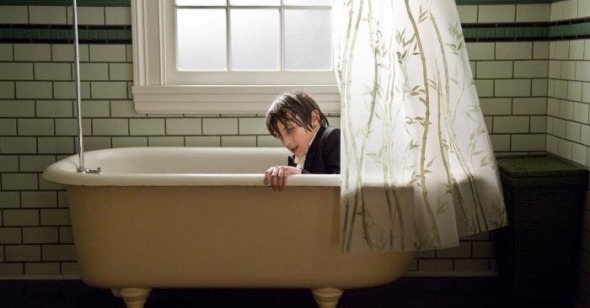Don’t Open
by Jeff Reichert
The Box
Dir. Richard Kelly, U.S., Warner Brothers
Many reviews of The Box will start out like: “After the disastrous reception that greeted Southland Tales, director Richard Kelly...” This opening apologia acknowledges the massive blunder that was Southland (though there are still a handful of defenders), and opens up wiggle room to reinstate Kelly as a filmmaker worth watching, regardless of the relative quality of The Box itself. His intelligence and ambition—perhaps even “vision”—will be referenced, his genre-mashing sensibility lauded, and even if the film might not be any good (more on that shortly), Richard Kelly himself will likely emerge unscathed to fight another day. In reality, what should be said of The Box, especially in the wake of Southland Tales, is that when it comes to Richard Kelly there’s no there there, and likely never was.
Set in Richmond circa 1976 so that Kelly can make needless reference to the Mars Viking missions (his reliance on locating his narratives within imagined near pasts and futures to create critical distance has grown tiresome), The Box jumps out of the gate and gets its titular parcel into the hands of its protagonists, Norma and Arthur Lewis (Cameron Diaz and James Marsden) fairly quickly. Arlington Steward (Frank Langella, slumming it, but retaining dignity), an urbane gentleman with half a face digitally excised shows up soon after with a proposition: press the box’s big red button and receive a million dollars. The only catch: someone, somewhere in the world, who the Lewises don’t know, will die.
The way this setup’s been reiterated in marketing materials and reviews, you’d think that The Box would be some kind of intense ethical chamber drama in which two well-meaning, average Americans strapped for cash are pushed to their moral limits. That Kelly continually references the view of human purgatory expressed in Sartre’s No Exit (not only is Norma teaching it to her class, but a local theater production is about to launch) throughout only pushes The Box further into the realm of the morally queasy. You’d think this, but you’d be wrong. After about an evening’s worth of diegetic dithering (occupying about the first 20 minutes of the film), Norma smacks that button, cash is delivered, and we’re left with 95 minutes to slog through. These 95 minutes skip through Village of the Damned zombie-ism, cracked Parallax View-esque seventies conspiracy fears, Abyss-biting water molds, and a few stabs in the general direction of 2001 for good measure. This kind of genre play is Kelly’s stock-in-trade, and it might sound a bit like the modus operandi of one Quentin Tarantino. The difference: QT borrows to own, while Kelly’s references feel like debts waiting to be called in.
The more that’s revealed about Mr. Steward through the course of the film’s interminable second and third acts, and the more often Kelly cuts to shots of him standing alone in silhouette in an immense piece of set design surrounded by guards and a weird undulating ring of water, the more any possibility of suspense or tension slips away. What we’re left with [SPOILER—sort of—ALERT] is a story about some kind of wide-scale testing of the human race ordered by Mr. Steward’s employers, “the people who control the lightning,” who are abetted by the U.S. government. The individual button experiments are part of a larger test of mankind’s altruism, and nothing less than the human race’s continued existence is at stake. This scenario’s actually perfect B-movie fodder, but Kelly takes both himself and his material far too seriously to slip into the kind of camp that might have saved The Box.
Overlong and woefully undernourished, The Box relies far too heavily on Kelly’s brand of reverse Bressonism (instead of Bresson tracking down unknowns to play models, Kelly assembles unlikely celebrities and asks for woodenness and stereotype) to bear the heavy, heavy weight of his misguided pretensions. If Southland Tales proved his political sense simpleminded, The Box shows his grasp of ethical reasoning is most certainly remedial. Even worse, his structuring shows just how little interest he has in the ethical quandary the arrival of the box poses; Kelly just can’t wait to get to the wankery of his sci-fi. He’s looking more and more like a Brett Ratner for the chunky glasses set. The Box might have fared better as metaphysical science fiction if Kelly had not felt the need to ditch all but the least intriguing of his narrative’s ambiguities (for some reason the not uninteresting Steward is brought completely to earth, yet “the people who control the lightning” are left shrouded in mystery). Donnie Darko survives as an artifact largely because its youthful rush was well wedded to paradoxes the film seems unable to solve (though I hear the director’s cut tries hard). The problem with The Box isn’t that it’s too weird, as some might claim. It’s not nearly weird enough.
